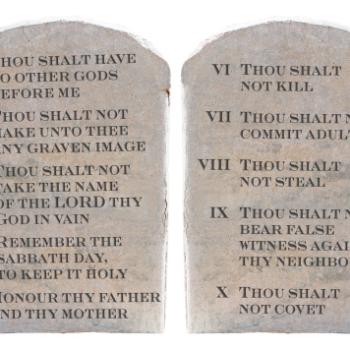Joel J. Miller has a Patheos blog in the Evangelical Channel, where mine is. On November 1, 2013, he posted “Five Reasons You Should Write in Your Books,” and it got a good response from his readers. Count me in, Joel! I’ve been doing that all of my adult life. But we’re talking about nonfiction books.
I have friends who think I’ve massacred my 2,500-volume library by doing the following to most of my books from cover to cover: underlining, highlighting, writing notes and making large asterisks in the margins, dog-earing pages, and best of all, filling up the inside cover and any blank front pages or title page with my most important notes in the text here being repeated, writing author quotations, summarizing, and rating the book. It’s also one of the reasons I don’t read nonfiction ebooks. So far, marking them is not as good and easy as it is in printed books.
“How dreadful!” some say. Yeah, I know theologians who treasure the books in their library so much that they consider it sacrilege to mark books. Some people think about how it devalues a person’s library, which it certainly does. But I didn’t buy those books for my relatives to sell as part of my estate they inherit when I’m dead and gone. I bought those books for me, for me to learn.
Why do I mark my books? Mostly because, as Joel points out, as the days slip by after I read some book, I increasingly can’t remember what I read in it. I want to learn everything I can from at least those books in my library that I think are worth my time spent reading them. But the biggest problem with reading is remembering. I don’t have a photographic memory. I mark books mostly so I can refer back to these markings at any later time.
Not only that, I mark all of my Bibles. (Biblia is the Latin word for “book.”) I’ve had friends who were aghast when they saw me writing in my Bible. One said, “How dare you mark up the Ho-o-o-ly Bible!” Well, have they ever heard of phylacteries? Orthodox Jewish men sometimes wore a small, square, leather box strapped to their forehead or forearm, called a “phylactery.” It contained materials, such as pieces of paper, with scripture quotations written on them to which these men referred for memorizing. Talk about making the Bible look weird, phylacteries worn on the forehead make the face look weird. But heh, whatever it takes to get God’s words deep into our souls that helps us learn about him and live for him.
Then, what rating do I give my Bibles? That’s the only marking I don’t do in my books. There isn’t any rating high enough for the words spoken by the Most High God and recorded in the Ho-o-o-ly Bible.












